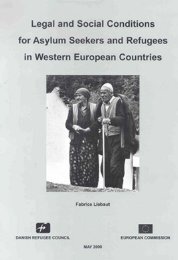I External aid
I External aid
I External aid
Create successful ePaper yourself
Turn your PDF publications into a flip-book with our unique Google optimized e-Paper software.
Horizontal Issues<br />
The European<br />
Community is fighting<br />
drug consumption<br />
and trafficking<br />
in over 100 non-EU<br />
countries.<br />
36<br />
6. DRUGS<br />
ANNUAL REPORT ON THE IMPLEMENTATION OF THE EUROPEAN COMMISSION’S EXTERNAL ASSISTANCE<br />
Prevention, treatment, social and professional rehabilitation<br />
of addicts, epidemiological studies, combating money laundering,<br />
creation of new legislation… The questions raised by<br />
the trafficking and consumption of drugs are demanding targeted<br />
specific answers as part of a global strategy. These are<br />
the objectives of the European Union Action Plan in this<br />
field.<br />
Drug use is no longer the prerogative of rich nations, as<br />
consumption in less advanced countries has risen fast – for<br />
example in Southern Asia, heroin… Aside from the attendant<br />
problems of corruption and criminality, this consumption is<br />
a major vector in the spread of AIDS and hepatitis.<br />
Faced with the world-wide drug problem, the Commission<br />
has adopted a global strategy which finds concrete expression<br />
in the European Union’s Anti-Drug Action Plans.<br />
2000-2004 ACTION PLAN*<br />
The plan responds to the following objectives:<br />
- ensuring that combating drugs remains a major EU action<br />
priority;<br />
- reducing both supply and demand and the negative<br />
effects of drug consumption;<br />
- continuing to gather, analyse and disseminate objective,<br />
reliable and comparable information on the drug phenomenon<br />
in the EU, with the help of the EMCDDA** (European<br />
Monitoring Centre for Drugs and Drug Addiction) and<br />
Europol;***<br />
- promoting police co-operation between Member States<br />
and promoting international co-operation.<br />
* http://emcda.org/multimedia/actionplan/cordrogue32en.pdf<br />
** http://www/emcdda.org<br />
*** http://www.europol.eu.int/home.htm<br />
© Gamma/Photo News<br />
In line with the recommendations of the United Nations<br />
General Assembly Special Session on Drugs (UNGASS, June<br />
1998), (30) Community co-operation is taking three main<br />
directions:<br />
◗ measures to reduce both demand and supply in a balanced<br />
fashion;<br />
◗ the principle of “shared responsibility” between producer,<br />
transit and consumer countries;<br />
◗ making drug control an integral part of development cooperation.<br />
The Commission is currently focusing its actions on the two<br />
main routes along which drugs are entering the European<br />
Union (see box). In order to achieve a more appropriate response<br />
to the problem, it is also seeking to improve its knowledge<br />
of the drugs situation in third countries, by financing<br />
data gathering projects in these countries.<br />
6.1. Activities in 2000<br />
Today the European Community is supporting a raft of projects<br />
to combat drugs in over 100 non-EU countries. These<br />
programmes, with projects in excess of €100 million,<br />
include prevention, treatment, the social and professional<br />
rehabilitation of addicts, epidemiology, alternative development<br />
for drug crop farmers, control of precursors; (chemicals<br />
used for drug production) customs and police co-operation,<br />
institutional support for developing national policies, cracking<br />
down on money laundering and new legislation.<br />
The Community has also co-financed reports by the l’Observatoire<br />
géopolitique des drogues (OGD), (31) which presents<br />
the situation of the drug phenomenon from a global and geopolitical<br />
angle. The Commission has maintained its support<br />
for a number of projects to reduce drug demand, working<br />
together with governments and NGOs. Apart from funding<br />
projects involving treatment, re-integration of drug addicts<br />
and the reduction of risks associated with drug addiction, it<br />
is supporting the setting up of NGO networks which make it<br />
easier to identify and spread best substitution practices.<br />
Lastly, the Community is funding several programmes to<br />
combat money laundering and is joining the effort undertaken<br />
by the OECD in this field.<br />
(30) http://www.un.org/ga/20 special<br />
(31) http://www.ogd.org

















